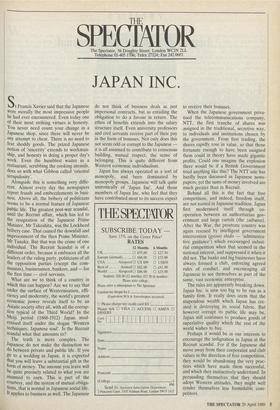SPEC ThE TAT OR
The Spectator, 56 Doughty Street, London WC1N 2LL Telephone 01-405 1706; Telex 27124; Fax 242 0603
JAPAN INC.
St Francis Xavier said that the Japanese were morally the most impressive people he had ever encountered. Even today one of their most striking virtues is honesty. You never need count your change in a Japanese shop, since there will never be any attempt to cheat. There is no need to fear shoddy goods. The prized Japanese notion of 'sincerity' extends to workman- ship, and honesty in doing a proper day's work. Even the humblest waiter in a restaurant, scrubbing the cooking utensils, does so with what Gibbon called 'oriental scrupulosity'.
Alongside this is something very diffe- rent. Almost every day the newspapers report frauds and embezzlements in busi- ness. Above all, the bribery of politicians seems to be a normal feature of Japanese Public life. The greatest post-war scandal, until the Recruit affair, which has led to the resignation of the Japanese Prime Minister, Mr Takeshita, was the Lockheed bribery case. That caused the downfall and Imprisonment of the then Prime Minister, Mr Tanaka. But that was the crime of one Individual. The Recruit Scandal is of a different order, because it embraces all the leaders of the ruling party, politicians of all the opposition parties (except the com- munists), businessmen, bankers, and — for the first time — civil servants.
What are we to think of a country in Which this can happen? Are we to say that under the surface of Westernisation, effi- ciency and modernity, the world's greatest economic power reveals itself to be an Asiatic society after all, with all the corrup- tion typical of the Third World? In the Meiji period (1868-1912) Japan mod- ernised itself under the slogan 'Western techniques; Japanese soul'. Is the Recruit scandal what that amounts to?
The truth is more complex. The Japanese do not make the distinction we do between private and public life. If you go to a wedding in Japan, it is expected that you will leave a substantial gift in the form of money. The amount you leave will be quite precisely related to what you are assumed to earn. This is part of the courtesy, and the system of mutual obliga- tions, that is normal in Japanese social life. It applies to business as well. The Japanese do not think of business deals as just impersonal contracts, but as entailing the obligation to do a favour in return. The ethos of benefits extends into the salary structure itself. Even university professors and civil servants receive part of their pay in the form of bonuses. Not only does this not seem odd or corrupt to the Japanese — it is all assumed to contribute to consensus building, mutual respect, the sense of belonging. This is quite different from Western economic individualism.
Japan has always operated as a sort of monopoly, and been dominated by monopoly groups. Japanese will talk quite unironically of 'Japan Inc'. And those members of Japan Inc. who feel that they have contributed most to its success expect to receive their bonuses.
When the Japanese government priva- tised the telecommunications company, NTT, the first tranche of shares was assigned in the traditional, secretive way, to individuals and institutions chosen by the government. From first trading, the shares rapidly rose in value, so that those fortunate enough to have been assigned them could in theory have made gigantic profits. Could one imagine the explosion there would be if a British Government tried anything like this? The NTT sale has hardly been discussed in Japanese news- papers; yet the sums of money involved are much greater than in Recruit.
Behind all this is the fact that free competition, and indeed, freedom itself, are not rooted in Japanese tradition. Japan first modernised itself through co- operation between an authoritarian gov- ernment and large cartels (the zaibatsu). After the War, the prostrate country was again rescued by intelligent government intervention (gyosei shido — 'administra- tive guidance') which encouraged indust- rial competition when that seemed in the national interest, and suppressed it when it did not. The banks and big businesses have always formed a club, enforcing agreed rules of conduct, and encouraging all Japanese to see themselves as part of the same, vast economic enterprise.
The rules are apparently breaking down. Japan Inc. is now too big to be run as a family firm. It really does seem that the stupendous wealth which Japan has cre- ated is destroying its social fabric. But however corrupt its public life may be, Japan still continues to produce goods of superlative quality which the rest of the world wishes to buy.
Perhaps it would be in our interests to encourage the indignation in Japan at the Recruit scandal. For if the Japanese did move away from their corporatist and club values in the direction of free competition, they would be abandoning the very prac- tices which have made them successful, and which they instinctively understand. In persuading themselves that they should adopt Western attitudes, they might well render themselves less formidable com- petitors.


















































 Previous page
Previous page